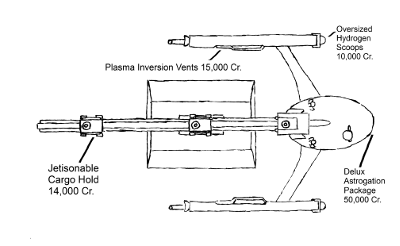by Albin Johnson
|
Editor’s note: The following material comes from a PBEM game run by Albin Johnson circa 2001-2002. Life in the Space Lanes was an adventure involving the crew of a freighter travelling the Frontier. Albin created some great background material for that game and in particular this material on the expenses involved in running a freighter. The Knight Hawks rules covered financing a ship but overlooked a lot. In light of the recent serial adventure, “Mooks Without Number”, we thought this material would be handy for anyone running a freight hauler campaign or continuing where “Mooks” left off. |
You’ve managed to get your hands on a shiny, new (or maybe not so shiny and not so new) freighter and have dreams of plying the space lanes and gathering untold wealth as an independent merchant. That’s all well and good, but have you considered all the expenses involved. Here are just a few that you will have to deal with.
Starship Registration (required annually)
This document registers the starship as a space-worthy vessel that can travel the space lanes safely. It also labels the ship with a public name, number, and transponder signature that can be identified by any starship, space station, or space port in the Frontier. The name and number are stenciled onto the side of the ship. The transponder is programmed by station or port personnel. It is illegal to tamper with a transponder or change its signature, but this is a common ploy of pirates and smugglers. Some illegal ships run with more than one transponder, switching out the signals as necessary.
Registration must be done for a specific planet in the Frontier. From that point on, the ship is registered under that planet's authority and is recognized as representing that planet and star system. Registration can be changed as often as is preferred, but the fee is the same and must be paid each time. Registration can be done at any space station or space port at the planet's Commerce Department Office and requires an inspection by the station or port's head starship engineer. The entire process takes 1d5 days. Criteria for passing inspection will be an operational engine, life support system, and bridge controls. Serious defects or damaged systems will be called into question and will require repair before being passed. This is at the GM's discretion.
Before registering one's ship at a specific planet, consider the government's tax laws, import-export laws, the state of their economy, and whether or not they are at war.
Cost: Hull Size of ship x 1000 credits
Insurance (required annually)
Insurance covers the value of cargo as assessed from the source, not the destination. This is because of the highly speculative nature of selling goods at their destination - there is no guarantee the haulers will actually realize selling value if the cargo is lost before it reaches its destination. For this reason, many suppliers will ask to see proof and extent of insurance before letting freight be loaded onto a ship. This is to ensure that the freighter will have the money to cover losses if any occur (like under-insured insurance in an automotive policy). Claims filed for losses will be investigated by a representative of the insurance company, to verify the validity of the claim.
Cost: Annual Premium:5% of maximum freight value coveredif paid in a single lump sum. Or it can be paid in 10 monthly installments at 6%/10 cr per month.
Freighter License (required annually)
This license entitles a starship to carry freight from one star system to another. This license is issued by the UPF, not a single planet or system, so is therefore unbound by any single planetary government. Licensure is for any cargo listed on the Knight Hawks cargo tables, but assumes proper facilities and preparation for risky cargo such as radioactive or flammable products.
Cost: Hull Size of ship x 1000 credits
Guild Membership (Freighter's Guild)
The Freighter's Guild is a registered union representing all independent interstellar freight-haulers operating in the Frontier. It lobbies for the rights of freighters by appealing to the UPF and local planetary governments. Its sole mission is to preserve a competitive market in the Frontier economy that will allow independent haulers to operate in spite of heavy pressure from megacorporations to consolidate and monopolize shipping. It is also constantly pressuring the UPF to lower tariffs and soften transport inspections to make shipping easier and more profitable. The Guild often finds itself at odds with Star Law, which opposes relaxing the security of the Frontier in any way. Sometimes the work of the Guild lies outside of the law, using funds to buy special consideration from port authorities, establishing connections with the underworld for exclusive shipping rights, and occasionally offering muscle when members need protection from the megacorps.
The Guild has offices on every commercial space station and at every civilian starport throughout the Frontier. Limited lodging is available near these offices at a reduced rate for Guild members. The Guild also provides special rates for leasing or buying weapons and equipment and for loans. Items can be leased at a cost of 10% of the item value compounded every 40 days. Items can be purchased at a 10% discount. Loans are made at 3% monthly interest rate instead of the 4% listed in the Knight Hawks rules. Collateral must still be provided or a tracer implant will be required. On the other hand, it is not uncommon for the Guild to ask its members to perform duties for the Guild that may skirt the law to varying degrees. This is another price for Guild membership, but it normally works to help the cause of the Guild and its members.
The Guild is divided into factions. These factions came from various shipping markets that already existed in the Frontier, such as major Vrusk trade houses and even the smuggling network around Dramune. They banded together to reinforce their strength in the Frontier economy, but they tend to have drastically different opinions about how the Guild should operate. Characters joining the Guild will be strongly influenced to join a faction. The GM can decide later how faction loyalty will play into the gaming campaigns, including positive reactions from fellow faction members and even violent reactions from rival factions.
Membership Cost: 100 credits annually per member
Advertising
Advertising goods and services in the Frontier involves plugging into the large infrastructure already put in place by the megacorps. The biggest venues would be the Galactic Task Force (GTF) boards, used for employment and contractual work, and Star Play's Classifieds, used to advertise goods for sale or trade. Both outlets enjoy a heavy presence in highly developed areas, especially over electronic media. One can easily find animated holographic panels pushing products from GTF and Star Play in every city, star port, and space station. Placing ads requires specifying how far the ad will be distributed and for how long. Ads can be text-only or thirty-second media pieces with audio/video. A GTF or Star Play office will film a media clip for 100 credits. Distribution of the ad can range from local to across the entire Frontier. Local ads appear on a single station, port, or city. The next levels of distribution include planetary-wide, system-wide, and ultimately across the entire Frontier.
Standard Classified/Posting Rates
|
Service |
Cost per day |
|
Text-only, thirty words |
1 cr (local) |
|
Text-only, unlimited words and still images |
10 cr (local) |
|
Visual/audio ad - 30 seconds |
100 cr (local) |
|
Planetary-wide distribution |
10x standard rate |
|
System-wide distribution |
100x standard rate |
|
Frontier-wide distribution |
1000x standard rate |
Ship Repairs
Fixing a starship subsystem such as lighting on a given deck or any isolated system can be done by a starship engineer using the standard repair rule. Replacing these systems costs 200 cr x the hull size of the ship. Divide the ship's hull size by 2 and round up. This is the number of days it will take to replace the system.
Example: Quaroek decides the plumbing on deck 2 is old and will never work properly again. He decides to replace it. His ship is a hull size 6 vessel, so the cost of replacing it will be 6 x 200 = 1200 credits. It will take three days to replace it.
For more information, check out the Ship Maintenance Rule. [Ed. Note: I assume he was referring to the Spaceship Maintenance and Repairs section of the Knight Hawks Campaign Book (p10)]


